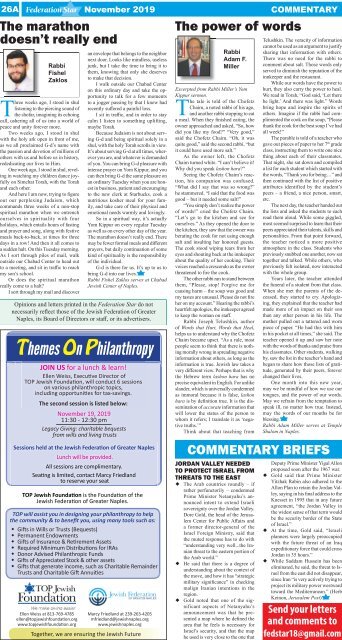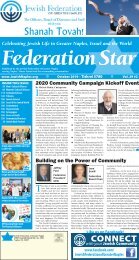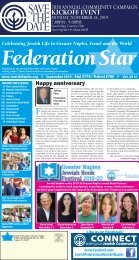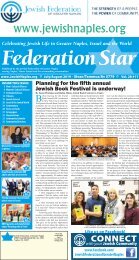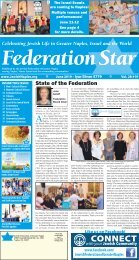Federation Star - November 2019
Monthly newspaper of the Jewish Federation of Greater Naples
Monthly newspaper of the Jewish Federation of Greater Naples
- No tags were found...
You also want an ePaper? Increase the reach of your titles
YUMPU automatically turns print PDFs into web optimized ePapers that Google loves.
26A <strong>Federation</strong> <strong>Star</strong> <strong>November</strong> <strong>2019</strong><br />
The marathon<br />
doesn’t really end<br />
Three weeks ago, I stood in shul<br />
listening to the piercing sound of<br />
the shofar, imagining its echoing<br />
call, ushering all of us into a world of<br />
peace and unity forever more.<br />
Two weeks ago, I stood in shul<br />
with the holy ark open in front of me,<br />
as we all proclaimed G-d’s name with<br />
the passion and devotion of millions of<br />
others with us and before us in history,<br />
rededicating our lives to Him.<br />
One week ago, I stood in shul, reveling<br />
in watching my children dance joyfully<br />
on Simchat Torah, with the Torah<br />
and each other.<br />
And here I am now, trying to figure<br />
out our perplexing Judaism, which<br />
commands three weeks of a non-stop<br />
spiritual marathon when we entrench<br />
ourselves in spirituality with four<br />
holidays, which entails hours of fasting<br />
and prayer and song, along with festive<br />
meals back-to-back, at times for three<br />
days in a row! And then it all comes to<br />
a sudden halt. On this Tuesday morning.<br />
As I sort through piles of mail, walk<br />
outside our Chabad Center to head out<br />
to a meeting, and sit in traffic to reach<br />
my son’s school.<br />
Or does the spiritual marathon<br />
really come to a halt?<br />
I sort through my mail and discover<br />
an envelope that belongs to the neighbor<br />
next door. Looks like mindless, useless<br />
junk, but I take the time to bring it to<br />
them, knowing that only she deserves<br />
to make that decision.<br />
I walk outside our Chabad Center<br />
on this ordinary day and take the opportunity<br />
to talk for a few moments<br />
to a jogger passing by that I knew had<br />
recently suffered a painful loss.<br />
I sit in traffic, and in order to stay<br />
calm I listen to something uplifting,<br />
maybe Torah.<br />
Because Judaism is not about serving<br />
G-d and being spiritual solely in a<br />
shul, with the holy Torah scrolls in view.<br />
It’s about serving G-d at all times, wherever<br />
you are, and whatever is demanded<br />
of you. You can bring G-d pleasure with<br />
intense prayer on Yom Kippur, and you<br />
can then bring G-d the same pleasure on<br />
an ordinary Tuesday when you are honest<br />
in business, patient and encouraging<br />
to the new clerk at <strong>Star</strong>bucks, cook a<br />
nutritious kosher meal for your family,<br />
and take care of their physical and<br />
emotional needs warmly and lovingly.<br />
So in a spiritual way, it’s actually<br />
Yom Kippur on every regular Tuesday<br />
as well as on every other day of the year.<br />
The marathon doesn’t really end. There<br />
may be fewer formal meals and different<br />
prayers, but daily continuation of some<br />
kind of spirituality is the responsibility<br />
of the individual.<br />
G-d is there for us. It’s up to us to<br />
bring G-d into our lives.<br />
Rabbi Fishel Zaklos serves at Chabad<br />
Jewish Center of Naples.<br />
Opinions and letters printed in the <strong>Federation</strong> <strong>Star</strong> do not<br />
necessarily reflect those of the Jewish <strong>Federation</strong> of Greater<br />
Naples, its Board of Directors or staff, or its advertisers.<br />
L<br />
Rabbi<br />
Fishel<br />
Zaklos<br />
Themes On Philanthropy<br />
JOIN US for a lunch & learn!<br />
Ellen Weiss, Executive Director of<br />
TOP Jewish Foundation, will conduct 6 sessions<br />
on various philanthropic topics,<br />
including opportunities for tax-savings.<br />
The second session is listed below:<br />
<strong>November</strong> 19, <strong>2019</strong><br />
11:30 - 12:30 pm<br />
Legacy Giving: charitable bequests<br />
from wills and living trusts<br />
Sessions held at the Jewish <strong>Federation</strong> of Greater Naples<br />
Ellen Weiss at 813-769-4785<br />
ellen@topjewishfoundation.org<br />
www.topjewishfoundation.org<br />
Lunch will be provided.<br />
All sessions are complimentary.<br />
Seating is limited, contact Marcy Friedland<br />
to reserve your seat<br />
TOP Jewish Foundation is the Foundation of the<br />
Jewish <strong>Federation</strong> of Greater Naples.<br />
TOP will assist you in designing your philanthropy to help<br />
the community & to benefit you, using many tools such as:<br />
• Gifts in Wills or Trusts (Bequests)<br />
• Permanent Endowments<br />
• Gifts of Insurance & Retirement Assets<br />
• Required Minimum Distributions for IRAs<br />
• Donor Advised Philanthropic Funds<br />
• Gifts of Appreciated Stock & other assets<br />
• Gifts that generate income, such as Charitable Remainder<br />
Trusts and Charitable Gift Annuities<br />
Marcy Friedland at 239-263-4205<br />
mfriedland@jewishnaples.org<br />
www.jewishnaples.org<br />
Together, we are ensuring the Jewish Future<br />
The power of words<br />
Rabbi<br />
Adam F.<br />
Miller<br />
Excerpted from Rabbi Miller’s Yom<br />
Kippur sermon.<br />
The tale is told of the Chofetz<br />
Chaim, a noted rabbi of his age,<br />
and another rabbi stopping to eat<br />
a meal. When they finished eating, the<br />
owner approached and asked, “So, how<br />
did you like my food?” “Very good,”<br />
said the Chofetz Chaim. “Oh, it was<br />
quite good,” said the second rabbi, “but<br />
it could have used more salt.”<br />
As the owner left, the Chofetz<br />
Chaim turned white. “I can’t believe it!<br />
Why did you speak lashon hara?”<br />
Seeing the Chofetz Chaim’s reaction,<br />
his companion was confused.<br />
“What did I say that was so wrong?”<br />
he stammered. “I said that the food was<br />
good – but it needed some salt!”<br />
“You simply don’t realize the power<br />
of words!” cried the Chofetz Chaim.<br />
“Let’s go to the kitchen and see for<br />
ourselves.” As they opened the door to<br />
the kitchen, they saw that the owner was<br />
berating the cook for not using enough<br />
salt and insulting her honored guests.<br />
The cook stood wiping tears from her<br />
eyes and shouting back at the innkeeper<br />
about the quality of her cooking. Their<br />
voices reached a crescendo as the owner<br />
threatened to fire the cook.<br />
The other rabbi ran to stand between<br />
them, “Please, stop! Forgive me for<br />
causing harm – the soup was good and<br />
my tastes are unusual. Please do not fire<br />
her on my account.” Hearing the rabbi’s<br />
heartfelt apologies, the innkeeper agreed<br />
to keep the woman on staff.<br />
Rabbi Joseph Telushkin, author<br />
of Words that Hurt, Words that Heal,<br />
helps us to understand why the Chofetz<br />
Chaim became upset. “As a rule, most<br />
people seem to think that there is nothing<br />
morally wrong in spreading negative<br />
information about others, as long as the<br />
information is true. Jewish law takes a<br />
very different view. Perhaps that is why<br />
the Hebrew term lashon hara has no<br />
precise equivalent in English. For unlike<br />
slander, which is universally condemned<br />
as immoral because it is false, lashon<br />
hara is by definition true. It is the dissemination<br />
of accurate information that<br />
will lower the status of the person to<br />
whom it refers; I translate it as ‘negative<br />
truths.’”<br />
Think about that teaching from<br />
COMMENTARY<br />
Telushkin. The veracity of information<br />
cannot be used as an argument to justify<br />
sharing that information with others.<br />
There was no need for the rabbi to<br />
comment about salt. Those words only<br />
served to diminish the reputation of the<br />
innkeeper and the restaurant.<br />
While our words have the power to<br />
hurt, they also carry the power to heal.<br />
We read in Torah, “God said, ‘Let there<br />
be light.’ And there was light.” Words<br />
bring hope and inspire the spirits of<br />
others. Imagine if the rabbi had complimented<br />
the cook on the soup, “Please<br />
thank the cook for the best soup I’ve had<br />
all week!”<br />
The parable is told of a teacher who<br />
gave out pieces of paper to her 7 th grade<br />
class, instructing them to write one nice<br />
thing about each of their classmates.<br />
That night, she sat down and compiled<br />
a list for each student which started with<br />
the words, “Thank you for being…” and<br />
then continued with the list of positive<br />
attributes identified by the student’s<br />
peers – a friend, a nice person, smart,<br />
etc.<br />
The next day, the teacher handed out<br />
the lists and asked the students to each<br />
read them aloud. While some giggled,<br />
most seemed surprised to learn that their<br />
peers appreciated their talents, skills and<br />
personalities. From that point forward,<br />
the teacher noticed a more positive<br />
atmosphere in the class. Students who<br />
previously snubbed one another, now sat<br />
together and talked. While others, who<br />
previously felt isolated, now interacted<br />
with the whole group.<br />
Years later, the teacher attended<br />
the funeral of a student from that class.<br />
When she met the parents of the deceased,<br />
they started to cry. Apologizing,<br />
they explained that the teacher had<br />
made more of an impact on their son<br />
than any other person in his life. The<br />
mother pulled out a tattered and worn<br />
piece of paper. “He had this with him<br />
in his pocket at all times,” she said. The<br />
teacher opened it up and saw her note<br />
with the words of thanks and praise from<br />
his classmates. Other students, walking<br />
by, saw the list in the teacher’s hand and<br />
began to share how those lists of gratitude,<br />
generated by their peers, forever<br />
changed their lives.<br />
One month into this new year,<br />
may we be mindful of how we use our<br />
tongues, and the power of our words.<br />
May we refrain from the temptation to<br />
speak ill, no matter how true. Instead,<br />
may the words of our mouths be for<br />
blessing.<br />
Rabbi Adam Miller serves at Temple<br />
Shalom in Naples.<br />
COMMENTARY BRIEFS<br />
JORDAN VALLEY NEEDED<br />
TO PROTECT ISRAEL FROM<br />
THREATS TO THE EAST<br />
The Arab countries roundly – if<br />
rather perfunctorily – condemned<br />
Prime Minister Netanyahu’s announced<br />
intent to extend Israeli<br />
sovereignty over the Jordan Valley.<br />
Dore Gold, the head of the Jerusalem<br />
Center for Public Affairs and<br />
a former director-general of the<br />
Israel Foreign Ministry, said that<br />
the muted response has to do with<br />
“understanding very well...the Iranian<br />
threat to the eastern portion of<br />
the Arab world.”<br />
He said that there is a degree of<br />
understanding about the context of<br />
the move, and how it has “strategic<br />
military significance” in checking<br />
malign Iranian intentions in the<br />
region.<br />
Gold noted that one of the significant<br />
aspects of Netanyahu’s<br />
announcement was that he presented<br />
a map where he defined the<br />
area that he feels is necessary for<br />
Israel’s security, and that the map<br />
he used is very close to the one that<br />
Deputy Prime Minister Yigal Allon<br />
proposed soon after the 1967 war.<br />
Gold said that Prime Minister<br />
Yitzhak Rabin also adhered to the<br />
Allon Plan to retain the Jordan Valley,<br />
saying in his final address to the<br />
Knesset in 1995 that in any future<br />
agreement, “the Jordan Valley in<br />
the widest sense of that term would<br />
be the security border of the State<br />
of Israel.”<br />
At the time, Gold said, “Israeli<br />
planners were largely preoccupied<br />
with the future threat of an Iraq<br />
expeditionary force that could cross<br />
Jordan in 35 hours.”<br />
While Saddam Hussein has been<br />
eliminated, he said, the threat to Israel<br />
from the east did not disappear,<br />
since Iran “is very actively trying to<br />
project its military power westward<br />
toward the Mediterranean.” (Herb<br />
Keinon, Jerusalem Post)<br />
Send your letters<br />
and comments to<br />
fedstar18@gmail.com<br />
P


